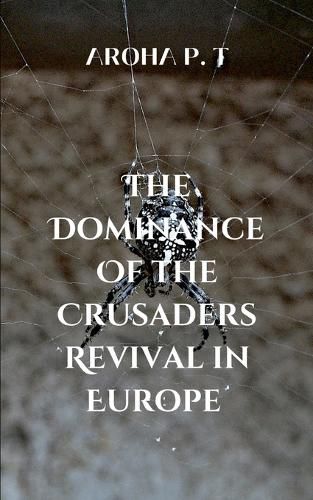Readings Newsletter
Become a Readings Member to make your shopping experience even easier.
Sign in or sign up for free!
You’re not far away from qualifying for FREE standard shipping within Australia
You’ve qualified for FREE standard shipping within Australia
The cart is loading…






This title is printed to order. This book may have been self-published. If so, we cannot guarantee the quality of the content. In the main most books will have gone through the editing process however some may not. We therefore suggest that you be aware of this before ordering this book. If in doubt check either the author or publisher’s details as we are unable to accept any returns unless they are faulty. Please contact us if you have any questions.
The Dominance of the Crusaders' Revival in Europe explores the profound impact of the Crusades on the development of European civilization and its lasting legacy. Set against the backdrop of medieval religious wars, the book examines how these conflicts, though initially focused on reclaiming the Holy Land, catalyzed a transformation in political, social, economic, and cultural dynamics across Europe. The story begins with an overview of the initial Crusades, shedding light on the motivations behind these religious wars and the role of the Catholic Church in galvanizing Christendom. It delves into the political instability of Europe, the feudal system, and the growing centralization of power within monarchies.
As monarchs and nobles mobilized resources for the Crusades, the shifting balance of power began to erode the old feudal structures, laying the groundwork for the emergence of centralized states. The book also examines the economic consequences of the Crusades. It highlights how trade routes were established between Europe and the East, facilitating the exchange of luxury goods, scientific knowledge, and cultural practices. This economic boom fostered the rise of powerful merchant cities ii like Venice and Florence, which would play pivotal roles in the Renaissance. The influx of goods from the Islamic world also contributed to agricultural innovation, transforming Europe's economy and society.
$9.00 standard shipping within Australia
FREE standard shipping within Australia for orders over $100.00
Express & International shipping calculated at checkout
This title is printed to order. This book may have been self-published. If so, we cannot guarantee the quality of the content. In the main most books will have gone through the editing process however some may not. We therefore suggest that you be aware of this before ordering this book. If in doubt check either the author or publisher’s details as we are unable to accept any returns unless they are faulty. Please contact us if you have any questions.
The Dominance of the Crusaders' Revival in Europe explores the profound impact of the Crusades on the development of European civilization and its lasting legacy. Set against the backdrop of medieval religious wars, the book examines how these conflicts, though initially focused on reclaiming the Holy Land, catalyzed a transformation in political, social, economic, and cultural dynamics across Europe. The story begins with an overview of the initial Crusades, shedding light on the motivations behind these religious wars and the role of the Catholic Church in galvanizing Christendom. It delves into the political instability of Europe, the feudal system, and the growing centralization of power within monarchies.
As monarchs and nobles mobilized resources for the Crusades, the shifting balance of power began to erode the old feudal structures, laying the groundwork for the emergence of centralized states. The book also examines the economic consequences of the Crusades. It highlights how trade routes were established between Europe and the East, facilitating the exchange of luxury goods, scientific knowledge, and cultural practices. This economic boom fostered the rise of powerful merchant cities ii like Venice and Florence, which would play pivotal roles in the Renaissance. The influx of goods from the Islamic world also contributed to agricultural innovation, transforming Europe's economy and society.